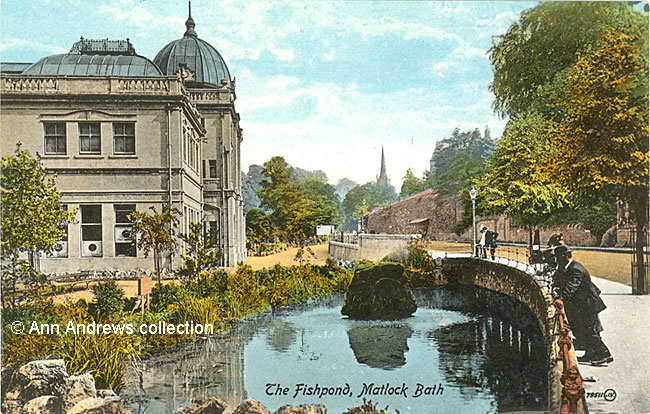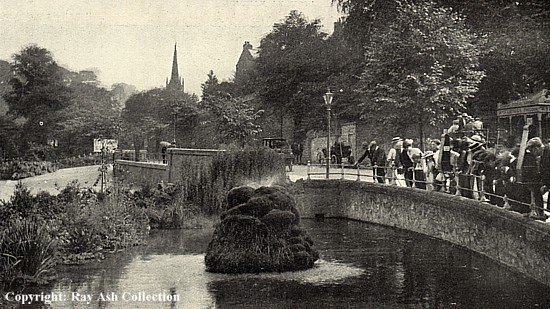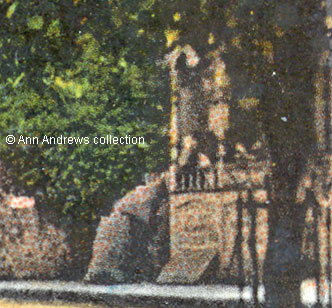|
Images Index> Matlock Bath, 20th and 21st Century Images> This page |
| Matlock Bath: The Fish Pond (1), 1911 - 14 |
| Matlock Bath : Twentieth Century Photographs, Postcards, Engravings & Etchings |
|
 |
|||||||||||||
The pond, formerly the horse pond, changed after the Kursaal (later the Grand Pavilion) was built on the grounds of the Ferry House and the Fish Pond Stables. Mr. Briddon had owned and operated a coaching business from the former stables. When he left, much of that business was taken over by Furniss of Matlock[1]. They had a booking office tucked into the corner, where the bus stop and shelter are today[2]. If you look carefully at the right hand edge of all three images, you can see a wooden structure that looks rather like a modern gazebo. The name Furniss can be read around the top. Of the three pre-war vehicles in the photo, the one behind the lamp post on the far side of the road from the Fish Pond belonged to William Furniss. The clothes the people are wearing are also pre-War, with these images dating from the early years of the reign of King George V. There are also two early fish food dispensers beside the railings in all three images.
The pool "is bordered with flowering plants and in the centre a fountain of thermal water plays from a pile of moss-grown stones[4]". Indeed, these images look as if relatively large pieces of tufa had been piled up around the fountain. Over the years they have fused into one large tufa rock. In February 1911 a local paper published the following "Old Crow Hears - That the Matlock Bath fishpond was an attraction for ladies last Friday". Whilst we have no idea who Old Crow was, his comment indicates that a number of unmarried women may have gone to the pond in the hopes of finding their Valentine[5]. 
More Matlock Bath images from the 1928 Ward Lock Guide
|
||||||||||||||
1. Photograph taken by Thomas Meredith Henshall of Matlock Bath. Image from Ward Lock & Co's "Matlock, Dovedale, Bakewell and South Derbyshire", Illustrated Guide Books of England and Wales (1928). From the collection of, provided for this website by and © Ray Ash. The same image was published in their 1922-23 guide, although Henshall's name was then given as E. T. Henshall. The photographs in the book were unlikely to have been taken specifically for the guide and were also not necessarily of the same date the book was published, as is the case here. 2. "The Fish Pond, Matlock Bath". Valentine's Series postcard, no. 79511 (black and white version) published in 1914. Unposted. © Maureen Smith collection. 3. "The Fish Pond, Matlock Bath". Valentine's Series postcard, no. 79511 (coloured version) published in 1914. Unposted. The stamp box states that the series "is a guarantee of British Manufacture. © Ann Andrews collection. Information written, researched by and © Ann Andrews. Intended for personal use only. |
||||||||||||||
References (coloured links are to transcripts or more information elsewhere on this web site): [1] Mr. Furniss advertised in Kelly's 1908, Kelly's 1912 and Kelly's 1916 trades directories. [2] Reminiscences of the late Frank Clay. Private papers © Ann Andrews. [3] "Derbyshire Times", 8 April 1911. [4] Ward Lock & Co's "Guide to Matlock, Dovedale, Etc.", Illustrated Guide Books of England and Wales. Information in a number of editions published between 1911 and 1932. [5] "Derbyshire Courier", 21 February 1911. [6] "Derbyshire Advertiser and Journal", 4 October 1919. Sale notice for the Fishpond Hotel. Lot 3 - Valuable piece of Building Land ocupying a most important position, with a frontage to the Turnpike road and known as "The Shrubbery", together with the Petrifing Well erected thereon. The Shrubbery and the petrifying well did not sell and were withdrawn. It had been built by William Pearson when he purchased land at the sale of the Old Bath in 1864.. [6] "Derbyshire Times", 5
November 1887. The Disputed Footpaths at Matlock Bath.
|










